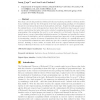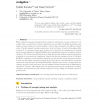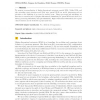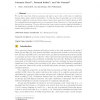99
Voted
CALCO
2015
Springer
9 years 10 months ago
2015
Springer
More than a decade has passed since Herbrand’s theorem was first generalized to arbitrary institutions, enabling in this way the development of the logic-programming paradigm o...
112
Voted
CALCO
2015
Springer
9 years 10 months ago
2015
Springer
120
Voted
CALCO
2015
Springer
9 years 10 months ago
2015
Springer
We extend earlier work on linear time fixpoint logics for coalgebras with branching, by showing how propositional operators arising from the choice of branching monad can be cano...
107
Voted
CALCO
2015
Springer
9 years 10 months ago
2015
Springer
We give a technique to construct a final coalgebra in which each element is a set of formulas of modal logic. The technique works for both the finite and the countable powerset ...
112
Voted
CALCO
2015
Springer
9 years 10 months ago
2015
Springer
We propose a generalization of higher-dimensional automata, partial HDA. Unlike HDA, and also extending event structures and Petri nets, partial HDA can model phenomena such as pr...
CALCO
2015
Springer
9 years 10 months ago
2015
Springer
100
Voted
CALCO
2015
Springer
9 years 10 months ago
2015
Springer
The syntactic monoid of a language is generalized to the level of a symmetric monoidal closed category D. This allows for a uniform treatment of several notions of syntactic algeb...
105
Voted
CALCO
2015
Springer
9 years 10 months ago
2015
Springer
Models of concurrent systems employ a wide variety of semantics inducing various notions of process equivalence, ranging from linear-time semantics such as trace equivalence to br...
CALCO
2015
Springer
9 years 10 months ago
2015
Springer
We use the connection between automata and logic to prove that a wide class of coalgebraic fixpoint logics enjoys uniform interpolation. To this aim, first we generalize one of ...
93
Voted
CALCO
2015
Springer
9 years 10 months ago
2015
Springer
In the semantics of programming languages one can view programs as state transformers, or as predicate transformers. Recently the author has introduced ‘stateand-effect’ trian...






